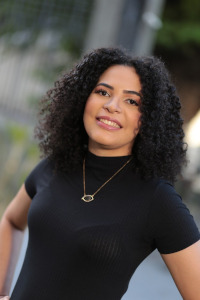These statements were made during COP28 by Commitment Makers from the Generation Equality Feminist Action for Climate Justice (FACJ) Action Coalition.
Anne Heloise, Engajamundo
 Hello, my name is Anne Heloise. I am from Brazil, from São Gonçalo, a marginalized region in the state of Rio de Janeiro. I, also, am a Youth Leader in the Feminist Action for Climate Justice Action Coalition of the Generation Equality Forum of UN Women.
Hello, my name is Anne Heloise. I am from Brazil, from São Gonçalo, a marginalized region in the state of Rio de Janeiro. I, also, am a Youth Leader in the Feminist Action for Climate Justice Action Coalition of the Generation Equality Forum of UN Women.
Thank you for this opportunity to speak. It is well-known that girls and women are the most affected by the impacts of climate change. Therefore, empowering women in climate transition processes is crucial.
To change the current reality, we need to acknowledge that education is the key to empowering girls. Training and leadership skill development are necessary for us to occupy decision-making spaces.
The inclusion of women in policy-making and adaptation and mitigation planning is essential for a fair process and to ensure progress in the gender equity agenda. We won’t stop the end of the world if we don’t achieve gender and racial equality for all.
Therefore, we need to improve the climate policies and empower girls. For that we are going to need data. That’s why we need a global stocktake that will consider an intersectional approach and will position the gender mark as a North Star to the design of new policies. Also, we need a loss and damage fund that is grant based and that has gender as a selection criteria. This money needs to get to the grassroots communities, especially the projects that are being led by black and indigenous women and girls.
At the local level, we are doing our best. So, we need decision-makers to make the right decision on the national and international level and implement the fossil fuel phaseout because we don’t have the time left to do this transition slowly. We need to start today. We are already behind on mitigating the damage that is caused by climate change.
So, we demand a sustainable future and the only way to achieve this is promoting gender equality.
Nupur Prakash, International Development Law Organization (IDLO)
 Excellencies and distinguished colleagues,
Excellencies and distinguished colleagues,
It is an honor to address this distinguished panel on behalf of the International Development Law Organization.
IDLO is the only global intergovernmental organization exclusively devoted to promoting the rule of law as an enabler of peace and sustainable development.
A proud leader and commitment maker to the Generation Equality Action Coalition on Feminist Action for Climate Justice, IDLO champions a rule of approach to feminist climate action.
Time and again, evidence and data have shown us the gendered face of the climate crisis.
Pervasive gender inequality in all levels of society means that women and girls are unable to realize their full potential in contributing to sustainable development and in scaling up solutions to the climate crises.
Gender-blind or discriminatory laws – particularly in relation to ownership of land and property, inaccessible pathways to justice and heightened insecurity due to risk of gender – based violence are all factors that impede women’s capacity to mitigate and adapt to climate change.
Despite being at the forefront of climate action, their voices are frequently marginalized in policy discussions and decision-making processes at global and national levels.
IDLO recognizes the potential of the rule of law in achieving climate justice for women and girls in all their diversity. It serves as a bedrock upon which equitable solutions can be built, and when rooted in feminist principles, it can be a powerful tool for dismantling systemic barriers and ensuring that climate policies are not only effective but also just and inclusive.
This is why, IDLO calls upon the international community to increase investment and support on:
- Empowering diverse groups of women and girls to claim environmental rights, access justice and actively participate in climate-related decision-making processes.
- Developing gender-transformative approaches to legal, institutional and regulatory processes related to climate and biodiversity.
- Strengthening women’s capacity to access and benefit from land and other natural resources, including through enhanced tenure security, elimination of discriminatory laws, and greater gender-responsiveness of customary and informal justice institutions.
Asikaralu Okafor, Village Farmers Initiative
 Your Excellencies, distinguished hosts and colleagues, it is my honor to address you today.
Your Excellencies, distinguished hosts and colleagues, it is my honor to address you today.
I am Mrs. Asikaralu Okafor, the Operations and Program Director of Village Farmers Initiative, a dedicated organization from Nigeria focused on achieving transformational food systems and climate adaptation.
My expertise lies at the intersection of indigenous food systems governance, gender equality and climate justice advocacy drawing from over 20 years of experience in the Agriculture, Entrepreneurship and Technology arena.
I am making a statement to you as a member of the Feminist Action for Climate Justice (FACJ) Action Coalition.
At this 28th session of the Conference of Parties, I want to shed light on a group whose voices often remain unheard in climate discussions and negotiations: indigenous women. These remarkable women are the guardians of nature, ancient cultures and traditional ecological knowledge. They contribute least to the impacts of climate change to their communities, yet are most vulnerable but lack capacity and resources for adaptation and building resilience.
Indigenous women often face a triple marginalization within the sphere of corporate activities.
Indigenous women are frequently situated in economically disadvantaged positions. Limited access to education, resources, and employment opportunities exacerbates their marginalization within corporate structures, hindering their economic empowerment.
By actively involving indigenous women in our pursuit of gender-responsive climate actions due diligence, we create a more inclusive and equitable world. It's a world where diversity is respected, where every individual's rights are valued and protected, and where the strengths and wisdom of indigenous women are recognized as essential building blocks for a better tomorrow.
I’m calling on the world leaders to scale up their support in:
- Safeguarding their rights to land and resources to ensure their meaningful participation in decision-making processes.
- Providing funds and access to recovery and reparation during climate crisis, for building resilience of livelihoods and landscapes tailored to their cultural heritages and traditions.
- I also ask that all Gender Based Violence (GBV) and environmental hazards be included in systemic data and in the National Action Plans (NAPs) and NDCs, for a gender equitable opportunity in the blue and green emerging economies.
Thank you.
Zainab Bie, Fridays for Future MAPA
 My name is Zainab Bie and I am From Delhi, India.
My name is Zainab Bie and I am From Delhi, India.
I stand before you not just as an individual but as the voice of countless women from the heart of India, where the echoes of injustice and inequality resonate through generations. Growing up, I witnessed the harsh reality faced by women who traveled miles to fetch water, girls denied the right to education, and communities grappling with the devastating impacts of the climate crisis.
In this interconnected world, privileges often define opportunities, creating a stark contrast between the haves and the have-nots.
Yet, from the shadows of adversity emerges a collective strength, a resilience that transcends borders. We, the women of the world, must stand united.
Our journeys have sculpted us into warriors—warriors who have witnessed injustice but refused to be defined by it. We are not just survivors; we are catalysts for change. The rooms where decisions are made may have excluded us for far too long, but we are here, demanding our rightful place at the table.
The climate crisis is not just an environmental issue; it is a human rights issue. As we gather here, let this be a call to action. It is time for COP28 to transcend rhetoric and embrace concrete steps. Gender equality and human rights must cease to be mere buzzwords—they are the heartbeats of a just and sustainable world.
The Global Stocktake and funding arrangements must reflect our voices, our struggles, and our aspirations.
In the face of adversity, we find our strength. We, the women of the world, are not just witnesses to history; we are the architects of a future where equality and justice reign supreme. So, Dear World Leaders, hear our voices, acknowledge our resilience, and stand with us as we pave the way for a world where every woman and girl can thrive.
Dr. Elizabeth Imti, Asia Indigenous Peoples Pact
 Your Excellencies, distinguished hosts and colleagues, it is my honor to address you today. I am Dr. Elizabeth Imti, and the Program Officer of the Indigenous Women’s Program (IWP) at Asia Indigenous Peoples Pact (AIPP). My role is dedicated to championing the rights and empowerment of Indigenous women across Asia, embodying unwavering dedication to social justice and gender equality. I am presenting remarks to you as a leader under the Resilient, Inclusive, and Sustainable Environments RISE grants challenge, which is funded by the United States Agency for International Development managed by the International Union for Conservation and Nature.
Your Excellencies, distinguished hosts and colleagues, it is my honor to address you today. I am Dr. Elizabeth Imti, and the Program Officer of the Indigenous Women’s Program (IWP) at Asia Indigenous Peoples Pact (AIPP). My role is dedicated to championing the rights and empowerment of Indigenous women across Asia, embodying unwavering dedication to social justice and gender equality. I am presenting remarks to you as a leader under the Resilient, Inclusive, and Sustainable Environments RISE grants challenge, which is funded by the United States Agency for International Development managed by the International Union for Conservation and Nature.
It is the globe’s first and only dedicated fund to help environmental programmes address the ways in which gender-based violence is used to maintain unequal power dynamics and limit the rights, roles, resources, and opportunities women can or cannot have in all environmental contexts, which are worsening under the pressures of climate change.
As the RISE grants challenge is part of a co-commitment between IUCN and USAID under Generation Equality’s action coalition on Feminist Action for Climate Justice – I am here to share with you that Indigenous women environmental human rights defenders continue to face threats to our safety while we are trying to sustain our livelihoods, preserve and perpetuate traditional knowledge that protects nature
So I call on the globe, seeking support to:
- End GBV at all levels and adopt measures to address intersectional marginalization. Ensure access to justice for Indigenous women and gender-diverse identities must be ensured by all actors around the globe.
- That Indigenous women must be recognised for their environmental leadership, specific contributions and knowledge in international climate governance, as well as in national governments and subnational authorities. So we are worthy of protection and support.
- I ask the globe to build more data and information on our safety from gender-based violence in connection to the climate crisis and mitigation projects. Supporting all actors to develop capacities to improve our safety, promote Indigenous knowledge and data sovereignty.
